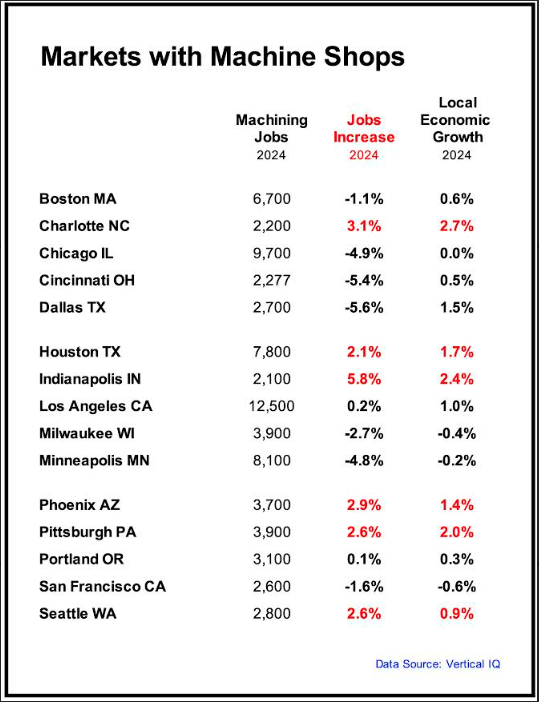Manufacturing is no longer the driving force in the American economy. Only 8 percent of US jobs are now in manufacturing, compared to 35 percent right after World War II. And despite government efforts to bring some of those jobs back from overseas, manufacturing actually lost more jobs in 2024.
In this tepid environment, one manufacturing industry that did selectively well in 2024 is machine shops. Overall, jobs at machine shops decreased by 2 percent, but in some markets, those jobs increased smartly.
Unlike many other industries, jobs at machine shops aren’t threatened by foreign competition. That’s partly because machining is no longer a labor-intensive industry with high labor costs – most of the actual machining is now done by computerized tools. But also because much of the work is customized, time-sensitive, and with fairly short production runs; farming this out overseas doesn’t make any sense.
In markets like Boston and San Francisco, where much of the work is for the computer industry and requires special skill, the average salary can be $80,000 a year, but for the industry as a whole, it’s $66,000. The biggest cost for machine shops is the expensive machine tools they require.
Because the customers of machine shops are other manufacturers, whether of computer equipment, car and airplane parts, or construction components, the work of machine shops is tied to the health of those local industries. And the cyclical nature of some, construction in particular, leaves them vulnerable to dips in demand.
Our table shows the number of jobs at machine shops in 2024 in 15 local markets, along with the change in 2024 and the growth of the local economy. It’s clear that the increase or decrease in machining jobs in most of these markets was connected with the strength or weakness of the local economy.

Charlotte, Houston, Indianapolis, Phoenix, Pittsburgh, and Seattle bucked the general trend and saw good job growth at machine shops. While Chicago, Cincinnati, Dallas, Milwaukee, and Minneapolis lost a lot of those jobs. The prospects for the industry in 2025 will likewise be mixed, requiring bankers and investors to look closely at the local industries that machine shops depend on.
Machine shops are just one piece of the broader economic landscape. We cover hundreds of industries, providing insights to help you stay ahead of trends and opportunities. Contact us to learn more.